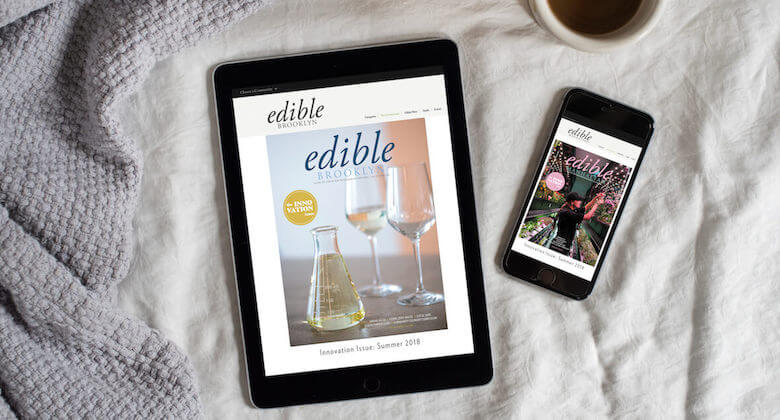
Editor’s note: You can read the full “innovation” issue here. It also includes stories from Edible Brooklyn, Edible Long Island and Edible East End. Use this map to find a hard copy near you, or better yet, subscribe here.
As we lead up to this fall’s Food Loves Tech, we’re chronicling how tech is changing the way we eat and drink. Our annual deep dive into appropriate food and ag technologies returns to Industry City on November 2–3, 2018 and you can get $20 off the regular admission price while our early bird special lasts.
I owe a lot to the lone plastic bag hanging from one of my kitchen drawer handles. My partner put one there a few months ago to collect scraps while he prepped dinner, and to my surprise, it’s proven to be the very unsophisticated (and pretty ironic) kitchen infrastructure I’ve needed to finally become a consistent composter.
I’ve dabbled in the composting arts for years, but for one reason or another—no convenient drop-off location, moving, forgetfulness, laziness—the habit hasn’t stuck until now. Of course my new favorite routine is possible because I’m one of the lucky few-but-growing number of New Yorkers who have easy access to a compost drop-off site (Wednesdays mornings at the Franklin and Eastern Parkway subway stop, FYI), but we’ll address that later in this issue. The point is that a truly small but inventive gesture has helped me cut my overall apartment waste by about a third. I take out the trash less, too, and it never stinks.
To me, this dangling bodega bag is innovative. That term might seem like a stretch these days since it doesn’t involve some gadget or software upgrade but more than most “disruptive” things incessantly peddled at us, there’s no question it helps make this city a better place.
Read more: From Our Editor-in-Chief: What Edible Stands For, and Will Always Stand For
The same goes for the rest of the stories in this issue. We interview a waste stream specialist and working mom about how she lives without a trashcan (and any potentially resulting pretense), and we go behind the scenes in some of our favorite restaurants to learn about a service that teaches job-focused English to staff with limited proficiency. We also document a monthly supper club party that unites queer women, trans and nonbinary people over shared dishes like sweet potato latkes and za’atar-spiced popcorn. We then celebrate an untraditional culinary school in Brownsville that teaches as many classes about the African diaspora and body language as it does about sourdough starters and knife skills.
Two of my favorite stories in this “innovation” issue ask what it means to eat local now that the idea has more than gone mainstream. Our longtime writer Regina Schrambling shines a light on a successful local food distributor that, instead of being an out-of-touch third party, is made by farmers, for farmers. We’re also proud to partner with the Food and Environment Reporting Network (FERN) for Rene Ebersole’s piece that questions what the rise of indoor, computer-driven farming means for urban agriculture.
We close with a conversation with Sam Kass, the former White House chef under the Obamas who’s now turned to the private sector to make change. He knows more than most what this means in politics, but he’ll also be the first to tell you that some of the most consequential and immediate actions we each can make for ourselves are right in our own kitchen. As if I needed any more reason to compost…



